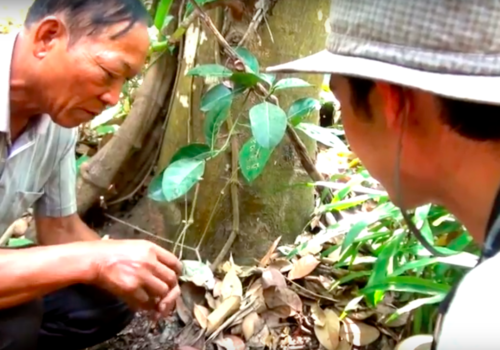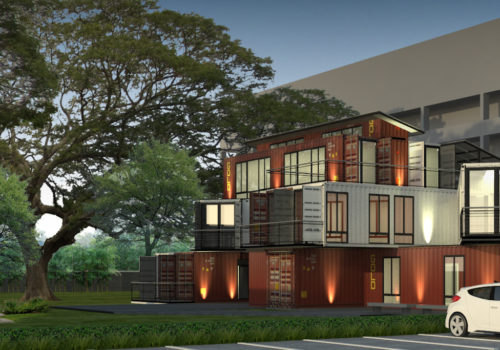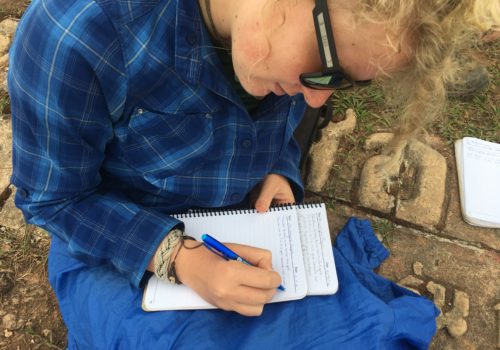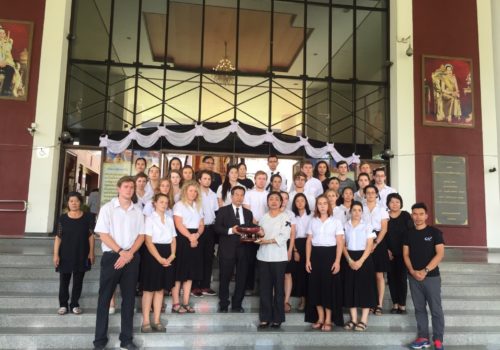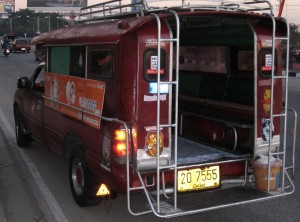
A "rot daeng" or "song taew" (two-bencher). A common mode of transportation for students.
This spring semester several of the students are blogging their experiences. Check them out for some great insights into Thai culture, homestays, and their adventures in Thailand! Here are some excerpts (with spelling and grammar left as is…)
Jack:
I’ll wake up every morning at around 5:45 AM when it is still dark out, but two hours after the roosters have started keekaakaaing around my window. When I can finally drag myself out of bed (usually around 6) I’ll shower, brush my teeth, and get dressed in my school uniform (white collared short sleeve shirt and black pants) so as to look reep roy (proper/put together).
I’ll eat breakfast and then bike ten minutes down the road to highway 118, where I can park my bike for 5 baat (~15 cents) at a small cafe/restaurant for the day. From there, I catch a rot luuang downtown, where I switch the the rot dang (red bus) that will take me to ISDSI. The ‘buses’ I refer to are actually called song tow, which means two benches, and pretty much describes the nature of the vehicle. They can comfortably fit around 10 people inside, though when adding those who hang off the back (often me) and the occasional person who rides on top, I have seen song tows hold up to 23 people, though two of the passengers I am counting are infants.
“You have to be at school by 7:30am. What time do you usually get to school?”
“7:00am or 7:05am.”
“Okay. We’ll drive you so you won’t be late.”That was part of last night’s dinner conversation. I got to school at 6:50am (a new record) today. Usually I take public transit and get to school pretty early, but my host parents wanted to be sure I was more than on time today.
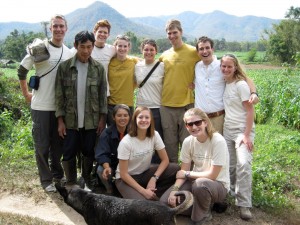
Farming in Mae Taa.
On this farm they began growing banana plants 20 years ago because they sprout up quickly giving shade to smaller plants. At the same time they planted mango trees as well as some smaller plant species like pineapple. After several years, the mango trees grew taller than the banana trees and began to choke them out. While at a “normal” farm this would be seen as a bad thing, the banana trees on this organic farm served their purpose, and the remains went back into the ground to fertilize the next wave of plant life.
The farm we visited was only on a couple of acres of land, but it had over 80 species of plants! It also included a small pond with tilapia. Chickens or other animals feed on vegetable/plant leftovers on the land, then the tilapia eat the chicken poop. Tilapia are very efficient, easily grown fish that provide an easy source of protein for the farmers.
Weekends are generally a good thing, but for some reason I had an absolutely spectacular weekend. It started with our group from ISDSI (17 students and 3 instructors) heading out to a site outside of Chiang Mai called “Crazy Horse”. Crazy Horse is a site for a series of caves and cliffs. We spent the morning exploring a couple different caves and learning about the different features of caves. We then zip-lined across one cave to a stalactite and repelled down 150 feet! It was pretty thrilling. We had lunch and then spent the afternoon rock-climbing the cliffs outside of the cave. I’m not the best climber, but I was surprised to find that I was very capable of climbing the different rock faces. I spent Friday night with my host family, and singing chereokee with Nong Yeem (my younger sister).
Saturday came and for the first time in about a week I got to sleep in! (til 9! haha…) I ate breakfast and did some homework, and then my Paw said that I needed to relax from my long day of climbing….so….our family went to the hot springs outside of the city! My afternoon was pretty harsh….taking a hot mineral bath (pretty much like a hot tub) and ending the day with a Thai massage. The hot springs are a popular picnic area, and when people eat at the hot springs, they boil eggs in the hot spring! haha it’s pretty sweet! My Paw asked me if I wanted an egg, and I said yes, so he popped an egg into the hot spring bath for about 3 minutes and bam! soft boiled egg!
Ben:
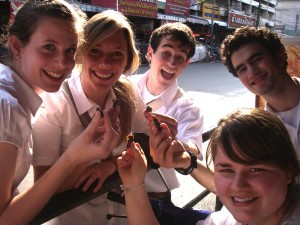
Fried crickets. Yum!
After three weeks of Thai class four hours a day and living in a Thai family my Thai has improved. This is something that is so rewarding as you begin to understand reading and writing more and more, and your speaking and comprehension of the language expands. This knowledge can be used immediately and enables you to communicate with your Thai family better and also understand the culture you are living in better. It is a great feeling to make progress especially against the challenges of the Tonal language with an alphabet that borrows from Sanskrit. I have a long way to go, but I am sure to get better with the 44 consonants, 32 vowels, and the 5 tones.
The Thai dinner table is the perfect setting for asking questions. Is this an animal or vegetable? Can you eat this(said with perfect sincerity)?
To the undiscerning eye your best luck is to simply watch what the locals do with the items on their plate.
Things do not become that much clearer even if you prepare the food yourself. I went to a Thai buffet. They bring hot coals to your table while you pick from dozens of raw meats which you will fry yourself. Seeing the food both before and after cooking it brings only marginally more enlightenment.
Tonight for dinner my host mother taugh me to make sweet green curry with chicken. While this seems straight forward one of the main ingredients is coagulated chicken blood. The most disturbing part is that the blood doesnt dissipate but instead remains as chunks that resemble soft tofu as you eat them. The dish was delicious despite the blood.
There are a lot of things I eat that I cant decipher but most of these things taste good in the end.
